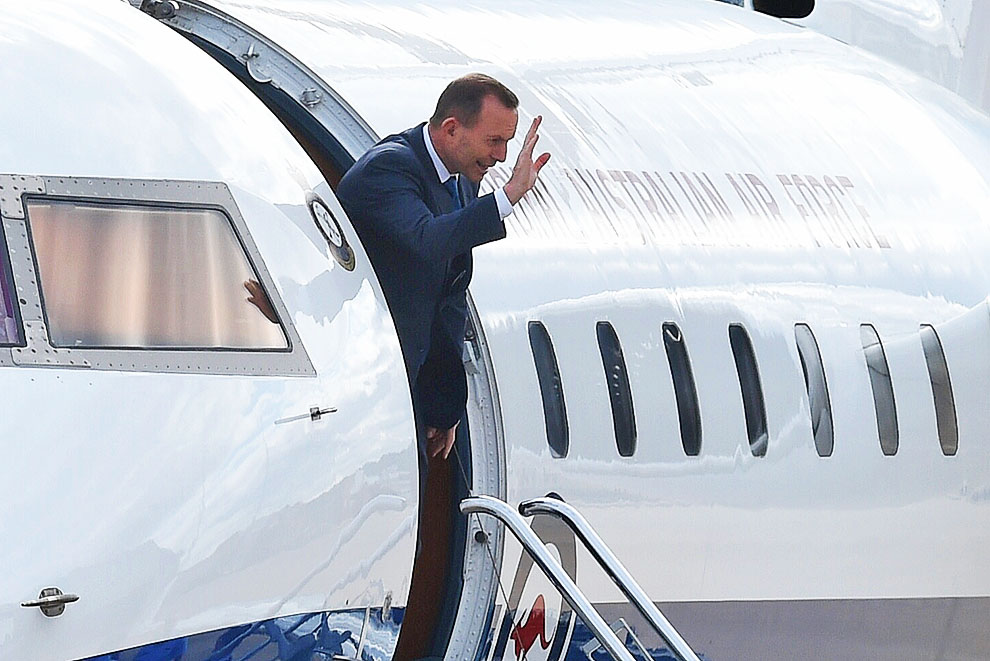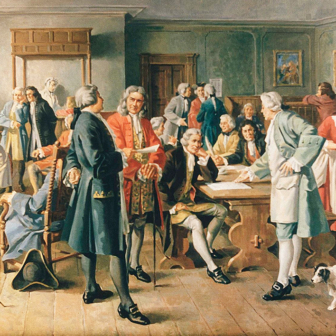Australia’s next ambassador to Washington gave an undiplomatic account last week of his chief motivation for leaving parliament. There was simply no reason to hang around – except one.
“If I was going to stay it would have to be overwhelmingly about getting even with people that brought me down,” Joe Hockey explained to Sky News. “I love my country and my family more than I hate my enemies.”
This decidedly peculiar utterance was widely interpreted as a shot at prime minister Malcolm Turnbull and foreign minister Julie Bishop, but it was more likely aimed at his former leader, Tony Abbott. It seemed like an invitation to contrast the conduct of the two men over the past three months: not a peep from the former treasurer, not a snipe or an undermining, while for Abbott the love–hate trade-off has evidently panned out the other way.
Being ejected from power the way Abbott was in September would be psychologically bruising and humiliating for anyone. Abbott has decided not to go quietly; barely a week passes without some public interjection. He claims he’s defending his legacy, and that this is good for the Turnbull government, but most of what he says is indulgent and unhelpful.
Like all individuals who made it to the peak of a major Australian federal party in recent decades, Abbott possesses exceptional talents. He has enormous energy and drive and a sometimes eerily calm psychological strength.
Becoming opposition leader is one thing, getting the prime ministership another, requiring not only the right personal attributes but also good luck and good timing. The previous three successful opposition leaders, Bob Hawke, John Howard and Kevin Rudd, snatched the leadership at just the right time to take their parties to likely change-of-government elections.
In his bid for the leadership in 2009, Abbott had the good fortune of favoured candidate Hockey’s announcement that, if elected leader, he would allow a conscience vote on the Rudd government’s emissions trading scheme. This would have guaranteed its passage through the Senate and negated much of the immediate motivation for toppling Turnbull. Hockey was eliminated in the first round of voting and the party room left with an invidious choice between Turnbull and Abbott.
Abbott won by the slimmest of margins. But still the timing was wrong: there was no way the election due in 2010 should have been a competitive contest. Although Abbott proceeded to make his own luck, he would have gone nowhere if Labor hadn’t overreacted to a narrowing of the opinion polls, first by dumping its emissions trading scheme and then by dumping its leader.
The first act was a precondition for the second, without which Labor would probably have comfortably won a second term and the Abbott experiment would have ended, written off as an interlude that seemed like a good idea at the time.
To remain leader after the hung-parliament election, Abbott needed strong opinion poll figures on voting intention. He delivered them, with his relentless energy and discipline, in spades. But again he received generous assistance from his opponents. Finally, in September 2013, he was elected prime minister with a big majority and the world at his feet.
New and re-elected governments usually enjoy polling bounces, but even before Labor had chosen a new leader its numbers had improved on its election performance. Then, barely three months in, the Coalition began trailing in the surveys.
Abbott was unlucky – inheriting sluggish growth, and faced with a difficult Senate – and he had his own well-documented faults, some of them overblown by commentators. From the outset, even before he had reason to fear for survival, he played to the self-selecting party “base,” seeming to mistake their fixations for the general electorate’s. But perhaps Australians were never going to warm to him, regardless of what he did.
Now it’s all over, leaving the question: what do you do with a former Australian prime minister? That resumé item bestows enormous stature: ex-PMs’ words are taken very seriously, and not just in this country. Few people would be interested in Julia Gillard’s views on education or Kevin Rudd’s on climate change if they had not once been leader of this middle-middle-power nation.
Abbott, as well as getting even, has been constructing his own ex–prime ministerial voice. Never one to obsess over policy detail, he seems to be targeting a niche in the “values” arena as defender of Western civilisation and speaker of conservative, sometimes unpalatable truths. Nothing he has said or written has been particularly insightful, complex or original, but the words carry the gravity of coming from a former national leader.
Perhaps because of his Anglocentrism, the Elder Statesman template he employs seems to be a British one, and the results are outsized and incongruous. Lecturing Europeans on immigration policy in London was odd enough, but the posturing advocacy of a greater “Western” determination to wipe out Islamic State, and the implicit slight on major powers for not already having boots on the ground in Syria, sits uncomfortably, to put it mildly, with the tiny contribution, in blood and bounty, in raw numbers and per capita, that Australia would make to any such exercise.
It’s even possible that people in nations who would carry the bulk of the effort might find such counsel from a country that routinely contributes below its weight quite offensive.
There’s an audience in Australia for these pronouncements, but it’s a small one. Perhaps 10 per cent of the voting public shows up in opinion polls as wanting Abbott back as Liberal leader. That’s enough to generate considerable personal validation and encouragement, in emails and letters, in shopping centres and airports, but is not nearly sufficient to provide a springboard back to the top job. But it might be enough to keep the fire burning – along with the encouragement of his commentator cheersquad.
Throughout his political career, Abbott has had a tendency to publicly quote or reference ideologically friendly newspaper reports and opinions, particularly from News Corp outlets. No account of his fall should ignore the role of these supporters in the media, who trilled and cooed at every “death cult” warning, marvelled as he “stood up to Putin,” joined him in every bash at the ABC, and egged on each and every muscular insertion into the culture wars.
Abbott’s enemies keep underestimating him, the gang gushed after each odd utterance. In projecting their own preoccupations onto the voting community they did him no favours.
Now that he’s gone, some in his praetorian guard concede that he could have turned the ideology down a notch or several, resorted to fewer slogans, used bigger words and moved his attention to the political centre.
But now, in their continuing loyalty, they’re at it again, encouraging him further down another blind alley with his counterproductive ruminations on Islam, Reformation and the superiority of Western values. In applying a culture warrior’s solution to the practical problem of jihadist violence, he’s not saying anything clever or useful – just the opposite. Real friends wouldn’t facilitate behaviour in a loved one that is so destructive to his legacy. •





